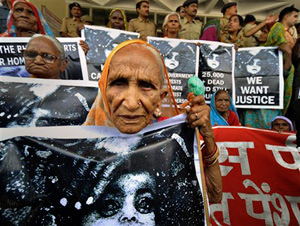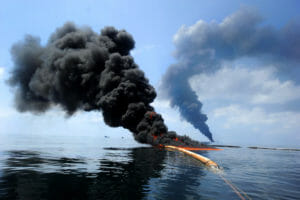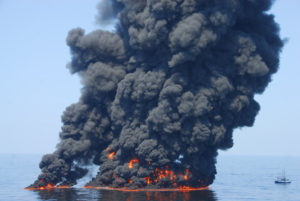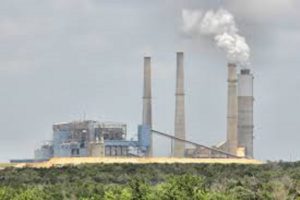From Bhopal to BP
The “massacre” sentences were far too light, but at least India put executives on trial. Let’s hope the U.S. has the will to fully investigate and, if warranted, try BP executives.
In the predawn hours of a December day 26 years ago a poison crept through a city of more than 650,000 souls, and soon many who inhaled the gas were dead. In addition to those who died directly from the fumes, others were fatally trampled in the panic that swept the area.
The estimates of the number who perished vary widely. One official source put initial deaths at nearly 3,000 and subsequent deaths at nearly 15,000; permanent disabilities were set at 50,000.
The toxin that attacked Bhopal, India, on that morning in 1984 was released accidentally from a pesticide plant owned by an Indian subsidiary of Union Carbide. Roughly 40 metric tons of a lethal chemical wafted into sleeping homes to be breathed by perhaps half a million people. The discharge occurred after water entered a tank of methyl isocyanate and created a runaway reaction that raised the temperature within the container to nearly 400 degrees Fahrenheit.
From time to time some element of the calamity’s aftermath was reported in the Western press, but before long the accident was mostly forgotten — but certainly not by the thousands who had been blinded or afflicted with cancer, respiratory ailments, neurological conditions or other medical troubles. Other people’s problems, especially when they occur in the faraway Third World, tend to have a short stay in the higher parts of our brains, chock-full of our own troubles big and small.
I had not thought about the Bhopal disaster for years before I saw a June 7 article in the Los Angeles Times headed “7 guilty in 1984 Bhopal disaster.”
The piece said those convicted were former executives of the Union Carbide subsidiary involved in the tragedy and that the men, all Indian nationals, had been sentenced to two-year prison terms after being found guilty of negligence. The second paragraph: “The trial represented the first criminal convictions in one of the world’s worst industrial disasters. But victims and activists declared the sentences wholly inadequate.”
The Indian press and others were vitriolic in denouncing the lateness and lightness of the sentences. The convicted men — released on bail bonds of $530 and expected to appeal the verdict — each were ordered to pay a whopping $2,100 fine, and Union Carbide India was assessed the breathtaking penalty of $10,600.
Indian officials shouldn’t be planning to spend that $10,600 just yet. The fine — tiny though it is, even allowing for differences in economic standards — may never be paid. The Times observed: “… Michigan-based Dow Chemical Co. acquired Union Carbide, the parent company, in 2001 and has denied any inherited responsibility for the incident or its aftermath.”
In 1989 Union Carbide did accept a $470 million out-of-court settlement, but that gave many victims and other survivors only about $500 each; these folks probably counted themselves as lucky, for others who suffered ended up with zero, zilch and zip.
The big fish associated with what some writers have called “the Bhopal massacre” continues to swim free. Warren Anderson, who was chairman and chief executive of the Union Carbide corporation in 1984, was arrested at the Bhopal Airport several days after the accident and was quickly released on bail. He promptly fled back to the United States. Some years afterward, Bhopal authorities charged him with manslaughter, and later he was declared a fugitive.
U.S. authorities were in no hurry to extradite the now 89-year-old Anderson, who turned out to be not too difficult to find. In 2002 Greenpeace reported that it had visited him at his home. In a Greenpeace website article headlined “Carbide criminal found,” the organization said:
Warren Anderson, former Union Carbide CEO at the time of the world’s worst industrial disaster in Bhopal, India in 1984, has been found living a life of luxury in New York State. He is wanted in India to face charges of culpable homicide over the deaths of 20,000 people since the disaster.
Anderson has been hiding in the US since an explosion at his company’s plant in Bhopal, India, caused the immediate deaths of thousands of people and has resulted in life long suffering for almost 120,000 survivors.
We paid Anderson a visit at his US home and handed him an arrest warrant. He was tracked down in a matter of weeks by a UK newspaper [that was working with Greenpeace]. He has been facing charges of culpable homicide and an extradition order from the government of India for the past eleven years. He has never appeared in court to face charges for crimes in Bhopal or even to explain why his company did not apply the same safety standards at its plant in India that it operated at a sister plant in the US state of West Virginia.
Week before last, U.S. Rep. Frank Pallone Jr., D-N.J., renewed his call for the extradition of Anderson, saying: “All those responsible for this disaster, including the former chairman of Union Carbide Warren Anderson, should stand trial in India and receive punishment that reflects the devastation and pain they have caused for thousands of people. Warren Anderson absolutely deserves to be extradited from the U.S. and punished for the full extent of his crimes.”India defended its good intentions by saying it has been requesting the extradition since 2003 but that the U.S. “has maintained that our request is not covered by the India-US extradition.”
In that same week, Robert O. Blake, a U.S. assistant secretary of state, said in Washington: “I don’t expect this verdict [the Bhopal convictions] to reopen any new inquiries or anything like that. On the contrary, we hope that this is going to help to bring closure to the victims and their families.” In other words, icicles will be forming in the warmest parts of Hades when the United States sends Anderson to face the music.
Blake was wrong about one thing, however — about the verdicts not opening “any new inquiries.” On June 10 the Indian government announced it would form a 10-member panel, headed by the home minister, to look at all issues surrounding the 1984 tragedy.
Certainly there is no shortage of allegations linking the accident to Union Carbide failures or wrongdoing. A number of sources have assembled collections of various official and unofficial charges against Union Carbide that could be placed in the following general categories: slipshod corporate planning and strategies; atrocious workplace practices and policies; faulty equipment; bad maintenance; dealing with employees in improper ways; failure to observe safety standards; failure to respond to a spate of earlier accidents and dangerous incidents.
Now I invite you to mentally gather up those seven allegations, close your eyes and turn around three times. After you steady yourself, look in the general direction of the Gulf of Mexico. I guarantee that at that point, unless you have been in a coma since April 20, you will have a vision of a vast expanse of oil-filled water and will think of two initials. Those initials will be a “B” and a “P,” and the menacing mixture will be the abomination that now resides off the coasts of Louisiana, Mississippi, Alabama and Florida.
Exactly why there was an explosion on the Deepwater Horizon rig — which BP leased from Transocean, the owner and operator — and why it is taking so long to stanch the resulting undersea oil gusher might be investigated for years. At the moment, no formal findings have been handed down in the case. However, what we do know doesn’t paint a pretty picture of BP’s practices in general and its actions on the Deepwater Horizon in specific. A handful of the reported facts and charges surrounding the BP oil spill follow, and they sketch a disturbing image of corporate negligence.
On June 8 Truthdig reprinted a ProPublica investigatory article that began, “A series of internal investigations over the past decade warned senior BP managers that the company repeatedly disregarded safety and environmental rules and risked a serious accident if it did not change its ways.” The piece, by Abrahm Lustgarten and Ryan Knutson, went on to say, “The confidential inquiries, which have not previously been made public, focused on a rash of problems at BP’s Alaska oil-drilling unit. …” BP’s practices in Alaska amounted to a troubling attack on industrial safety standards, according to article, which provided extensive documentation.
In the latter part of their report, Lustgarten and Knutson tell about Kenneth Abbott, a BP contractor employee who was responsible for doing internal audits and checking machinery on Atlantis, a huge BP rig in the Gulf of Mexico. Because of what he found and the nature of his dealings with BP, Abbott ended up suing the Minerals and Management Service in May in an effort to force the federal regulatory agency to shut down the operations on Atlantis.
Abbott told ProPublica: “I just hit a lot of resistance from the lead engineers. They got really angry with me. They wanted to shortcut the system and not do the reviews, because they cut short the man hours.” He estimated that BP’s improper maneuverings had saved the company up to $3 million.
“There seemed to be a big emphasis to push the contractors to get things done and that was always at the forefront of the operation,” Abbott said. “I felt there had to be balance. You had to have safety because people’s life depended on it. My management didn’t see it that way.”
In detailing BP’s safety deficiencies in Alaska, ProPublica said that some of the company’s equipment lacked gas and fire detection sensors and emergency shutoff valves:
When gas leaks from a pipeline break or a blowout near a running engine, it’s a lot like stomping on the accelerator of a car: The engine will suck up the fuel vapors and scream out of control. Gas sensors are critical to preventing an explosion, because they can shut down a rig engine before that happens.
Now investigators are learning that similar sensors—and the shutoff systems that would have been connected to them—were not operating in the engine room of the Deepwater Horizon rig that exploded in the Gulf of Mexico.
In sworn testimony before a Deepwater Horizon Joint Investigation panel in New Orleans last month, Deepwater mechanic Douglas Brown said that the backstop mechanism that should have prevented the engines from running wild apparently failed—and so did the air intake valves that were supposed to close if gas enters the engine room. … Another system was supposed to kick in and shut the engines down, but that system also failed. He said the engine room wasn’t equipped with a gas alarm system that could have shut off the power.
Kenneth Abbott, the engineer who spoke with ProPublica about the Alaska operation, was also interviewed by “60 Minutes” for its May 16 broadcast, “Blowout: The Deepwater Horizon Disaster.” Another person featured in that broadcast was Deepwater Horizon crew member Mike Williams.
Williams told “60 Minutes” that a BP manager had ordered a speedup: “And he requested to the driller, ‘Hey, let’s bump it up. Let’s bump it up.’ And what he was talking about there is he’s bumping up the rate of penetration. How fast the drill bit is going down.”
Williams also said that after an accident damaged the Deepwater Horizon’s crucial blowout preventer, “[A crewman] discovered chunks of rubber in the drilling fluid. He thought it was important enough to gather this double handful of chunks of rubber and bring them into the driller shack. I recall asking the supervisor if this was out of the ordinary. And he says, ‘Oh, it’s no big deal.’ And I thought, ‘How can it be not a big deal? There’s chunks of our seal is now missing.’ “
Mother Jones reported June 7 that a Houston lawyer representing 15 rig workers, among others, has a signed statement from a rescue boat crew member who claims he overheard the Deepwater Horizon installation manager, an employee of rig owner Transocean, screaming to someone over a satellite phone shortly after the rig exploded: “Are you fucking happy? Are you fucking happy? The rig’s on fire! I told you this was gonna happen.”
Even at this relatively early point in the case, the allegations of BP’s dubious practices and negligence could fill a book. (Click here for the Wall Street Journal article “BP Decisions Set Stage for Disaster.” Here for the “60 Minutes” transcript. Here to go to the website of the Deepwater Horizon Joint Investigation, being conducted by the federal government.) Of course, an allegation is not a finding of guilt, and nothing in this article should be seen as a demand for prison sentences stemming from the accident and the consequent contamination. Such determinations are the business of our justice process: investigation, formal indictments, trials, then sentencing if there are convictions. What I’m saying is that the case is rich with reasons for deep-reaching investigation. There are plenty of smoking guns lying around for the scrutiny of conscientious prosecutors, and anyone found guilty should be punished in line with the severity of this monstrous offense against man and the environment.
The Wall Street debacle of recent years has yet to offer a solid model for such investigation and prosecution. U.S. prisons have not exactly suffered an overcrowding problem as a result of convictions of the brokers, bankers, public officials and others who helped knock the American economy into a latrine. A cynic might say that officialdom is loath to bite the hands of the financiers and Wall Streeters who have counted out greenbacks so generously to the treasuries of those who ran for office and will run yet again. The same cynic might also note that the oil industry, too, hasn’t been stingy when it comes to forking over cash to ever-so-grateful politicians. Our nation, so quick to rightly put away a guy caught robbing a liquor store, is shamed by its traditional reluctance to investigate and try men and women who have ruined the lives of thousands or even millions. Crime involving illegal profit-seeking in the chambers of high finance or on floating platforms in the Gulf of Mexico should not be immune to vigorous investigation and prosecution.
American authorities, I believe, may find some civic guidance by looking across the ocean to the city of Bhopal. Let me quickly admit (1) that the Bhopal convictions were far, far too late in coming; (2) that the penalties were ridiculously, inappropriately light; (3) that the prison sentences may never be served and the fines may never be paid; (4) that India failed in its attempt to extradite the executive at the top of the Union Carbide food chain. To call the Indian action in this case feeble would be to rate it too highly. But please note, gentle reader, that the Indians did something. They hauled Union Carbide officials into court and obtained guilty verdicts. Controversy aside, the principle at work was an important one.
The Indians did not merely designate some underling as a fall guy and then congratulate themselves for ensuring that he would be dining on prison cuisine for the next 30 years. At day’s end, seven former executives were hauled before the bar of justice in a spectacular crime; the seven found guilty were among those who actually held responsibility for the Bhopal enormity. What was accomplished by the justice system is worthy of recognition, and now authorities are promising to probe further into the poisoning of still unknown numbers of innocent people.
Let’s hope something is done in the United States of America, quickly, over the poisoning of miles of its coastal water.
T.L. Caswell was on the Los Angeles Times editing staff for more than 25 years and now edits and writes for Truthdig.
Your support matters…Independent journalism is under threat and overshadowed by heavily funded mainstream media.
You can help level the playing field. Become a member.
Your tax-deductible contribution keeps us digging beneath the headlines to give you thought-provoking, investigative reporting and analysis that unearths what's really happening- without compromise.
Give today to support our courageous, independent journalists.





You need to be a supporter to comment.
There are currently no responses to this article.
Be the first to respond.